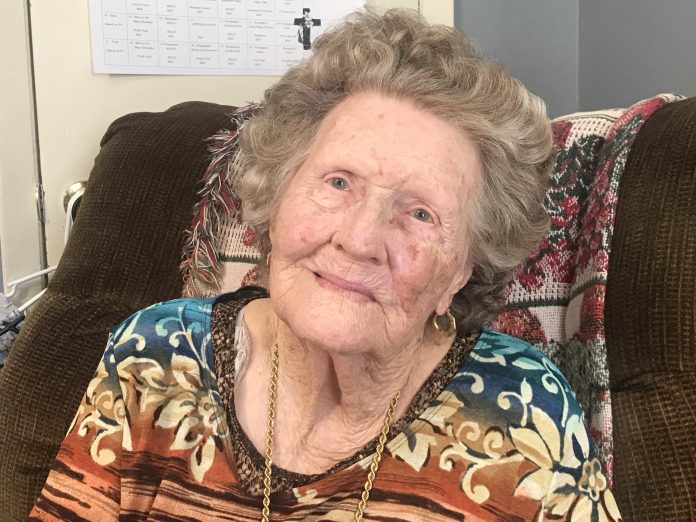HANCEVILLE, Ala. – Ruth Creel Brigham was born in 1924 on a farm about 2 miles outside of Hanceville. She was born during the Great Depression and although times were hard, she thanks family, school and church for getting her through and putting her on a path that would take her in so many interesting directions. Now, as a resident of Hanceville Nursing & Rehab Center and with some COVID restrictions being lifted, Ruth was able to share her story with the Tribune.
She said, “I was blessed with a father who was a minister-carpenter-farmer. There was always something to do. And a mother that knew how to stretch a dollar. We grew everything on earth, surely, in our garden. Commercially, we grew other things like strawberries. I did not experience hunger like some people did. We always had food and sometimes it was boring, but we ate what we grew.”
Ruth would graduate from Hanceville High School in 1943. Her brother had graduated from Auburn, but Ruth said she did not want to go to college. She explained, “I wasn’t as smart as he was in the first place. I was good at everything but math. I even passed chemistry, but algebra, no.” She knew she wanted to have a job, but with no factory jobs available, she relied on her typing skills learned in high school and enrolled at Birmingham Business College.
Six months later, as the country was engaged in World War II, an FBI agent came and interviewed Ruth and her classmates. She said, “He was recruiting people to go to Washington to take the place of those who had been drafted.” Three students would sign up, including Ruth. Ruth would be the only one who made the trip after the others backed out.
Ruth arrived in Washington D.C. not knowing what she would be doing or what to even expect. She smiled, “I was sworn in on the first day of Jan. 1944 in the mid of winter. I took all of my Alabama clothes with me and it was so cold. After we were sworn in, they put us on a bus and took us to Quantico and they told us about the FBI. They took us to an evidence room and showed us, for example, the ladder that was used to kidnap the Lindburgh baby and some stuff from the mafia.”
Ruth wondered when she would be shown the clerical department. She assumed she would be typing and putting her clerical skills to use. She was wrong. “The next day we were put on a bus and carried to a classroom. I saw on the blackboard what were obvious prints and designs,” she recalled. Ruth was trained to classify fingerprints in the male criminal files where she would work 10 hours a day for six days a week.
The hours might have limited her social life, but Ruth didn’t mind. She said, “I felt I was contributing. I was glad to go there and work. I know it was entry level work, but I felt I was contributing to the war effort and I was glad to do it.” She described wartime in Washington, “We had blackout shades where we lived and tried to block out as much light as we could. We had air raid warnings. Everything was going toward the war effort. Every appliance was made to last as long as it could. All the metal was going, and you could hardly find soap because it was going toward the war effort. Sugar and butter and other things–-it was going to feed the troops. It was tough, but we got through it and it made us better for it.”
Those who came to Washington would stay with families who agreed to allow them to stay with them. After being placed in a home she described as “dirty,” a co-worker invited Ruth to stay with her at another family’s home.
“314 Tennessee Avenue. I still remember the address. I asked my friend where she ate her supper. She said, ‘Around the corner at the Home Grill. The food is good and it’s not that expensive,’” Ruth said.
Ruth, her friend and several other girls went to the Home Grill and Ruth remembered fondly, “I noticed this tall young man and in enough of a Navy uniform that I could tell he had been in the Navy. Just as we got even with him, he asked, ‘Nancy, who is your friend?’ She said, ‘That’s Rusty, leave her alone.’ I had red hair then.”
As the girls were leaving, the tall young man was still there and he told Ruth’s friend, Nancy, ‘Bring her around again.’ Ruth continued the story, “I said to her, ‘who does the big lug think he is?’ I’ll have you know, I married that big lug two years later.”
Harold Brigham was seven years older than Ruth and a member of the Construction Battalion (Seabee). She said, “He was a wonderful guy. We married after dating for quite a while and had our first two children there (in Washington).”
Working at the FBI and dating Harold was difficult because of her long hours. Ruth was serious about Harold, so much so that she put in her notice at the FBI and went to work for the Chesapeake & Potomac telephone company. She said, “I worked for them until my daughter was about a year–and–a–half old.”
By then, the war was over. She recalled the ending of the war, “I was on a trolley on 14th Street when the war was declared over. The people piled onto the street and the trolley stopped. A sailor, it happened to be a sailor, reached through and yanked my hair and said, ‘The war is over Red!’ I said, ‘Well, you don’t have to yank me bald headed because the war is over!’”
Life was good for Harold and Ruth Brigham and their growing family. Then, at age 50, Ruth’s mother died. Ruth said, “She left a 12–year–old and another brother of mine in high school. I just felt the pull and we talked it over. He said, ‘You know, I would like to raise our children in the South.’ He saw I was serious, so we sold our home in Maryland and moved to Alabama.”
She continued, “We came home just knowing the good Lord was going to take care of us. My husband found a job and I was a stay–at–home mother until the children started school. Then I went to work at the school as an aide in the remedial reading program. My family and I worshipped at Old Union Church of Christ where my father preached with the Moody family.”
This is when Ruth would hear of a new facility being planned in the City of Hanceville. In Part 2, Ruth will reveal exactly what the facility came to be and the new path her life took at the age of 55.
Copyright 2021 Humble Roots, LLC. All Rights Reserved.



















